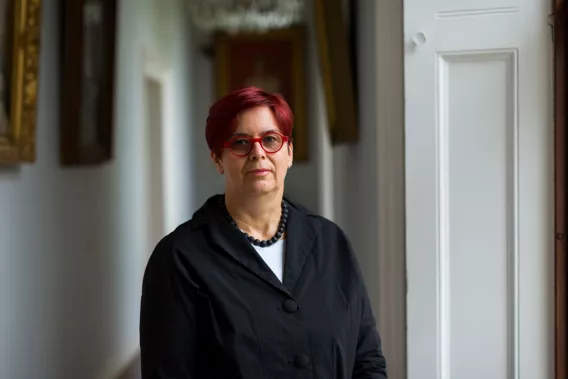When the new position of Vice President of Academic Affairs and Student Engagement (VPAASE) at the University of Limerick was offered to Kerstin Mey, she says that she was “hugely excited and eager to start” her UL journey.
“The excitement of joining a young and dynamic research oriented university with a sustained heritage of pioneering higher education programmes and modes of delivery has stayed with me over the past 22 months,” she says.
Since taking up the responsibilities for teaching and learning, the student experience and support, the new institutional Strategic Plan UL@50 was launched.
“It has at its heart a sustained commitment to driving academic excellence, to the transformation of education within the university’s broader civic and civil mission and a holistic approach to internationalisation.”
In addition, Professor Mey asserted that the programmes of study at UL benefit significantly from work-integrated learning.
“The university has played a pioneering role in the development of co-operative education. It currently places more than 2,100 undergraduate students annually with businesses in the region, nationally and internationally. Offering internships as a mandatory element of most Bachelor programmes – the exception are professional body approved programmes that have very specific requirement for work-integrated learning for instance in Allied Health disciplines – is no mean feat. It requires a well-honed system to prepare students, to nurture their independence and strengthen their resilience while taking into account the range and level of competencies, experiences and expectations of a diversifying student community.
Such scaled up endeavour has to be rooted in an expansive and sustainable employer network.
“Strong employer relationships are vital too for shaping future facing academic programmes that are relevant for students, their parents and guardians, and employers alike,” she adds.

Professor Mey, a graduate of Humboldt University in her home city of Berlin, argued that “this is particularly important as the occupational landscape and the patterns of employment are changing rapidly and radically under the influence of interconnected developments such as; ubiquitous digitisation, the global flow of capital and information; the exponential growth of knowledge, scientific advances, the proliferation of (disruptive) technologies; demographic dynamics and societal challenges like climate change; mass migration; military conflicts; water, food and energy security; public health; human rights.”
“This means that we have to continuously consider together with our students as co-creators of their learning how best to prepare graduates to tackle the profound professional and societal ruptures and shifts of the present and in the future, which include the attacks on the sciences and knowledge from the direction of populism.”
To meet the skills needs of the Irish economy identified by the State, UL has designed Masters in Artificial Intelligence, Data Analytics, Cyber Security, Finance and Machine Learning, amongst others, and through a collaborative effort now delivers a MSc in Digital Health Transformation.
“It creates degree apprenticeships supported by the Government’s Springboard initiative including Executive apprenticeships at Masters level and the first Professional Doctorate in Engineering.
UL explores emerging opportunities for flexible learning and continuous professional development through blended and online programmes of study.
“However, it is expensive to create such programmes in ways that maintain a quality social learning experience and high student retention rates. The development of digital learning objects and an engaging online delivery needs adequate Irish State funding.
“It benefits from collaboration of higher education institutions and with industry particularly at a time when universities face growing competition from a range of other education providers amongst them large multinationals which have set up their own academies of learning, as well as from potent online providers such as Udacity. Harnessing technological advances to facilitate learning involves a concerted effort to upskill educators.
“UL increasingly adopts a quintuple helix approach to innovation through which we develop our academic offer, our translational research directed at societal impact and our knowledge exchange and innovation efforts in sustainable ways: with other academic institutions nationally and internationally; with business and industry; with government and with communities.
“For instance, the team of the Research Evidence and Policy Programmes and Practice project, a strategic initiative co-founded by the Department of Children and Youth Affairs (DCYA) and the School of Law, offers an Executive Leadership programme for people in Government and statutory and voluntary organisations with responsibility for addressing complex problems,” she adds.
The integration of community engaged learning and research opportunities for students forms an important dimension of many of the UL education programmes, Professor Mey explains.This is realised through Practicums co-designed and co-delivered with local communities and supported by a partnership with Limerick City and County Council and the HSE; placements of students in schools and health contexts; through targeted inquiry and project work as well as through a multitude of recognised volunteering opportunities for UL students at all levels.
“Working in and with communities contributes to consolidating our successful track record of nurturing aspirations, growing talent and fostering education support and networks to widen access to higher education,” says Kerstin.
In partnership with the Social Entrepreneurship incubator BNest, UL promotes social entrepreneurship and complements its support for commercial start-ups through the Nexus Innovation Centre. The University prototypes and pilots ‘effectual education’ programmes that shape creative and ‘entrepreneurial’ mindsets.
“This marks a shift in emphasis from educating highly employable graduates (job takers) – for which Irish universities have been internationally renowned – towards developing agile and adaptable graduates, who are inquisitive and imaginative; who ‘think big picture’ and critically reflect; who embrace complexity and take risks; who stay current through life-long and accelerated learning; who effectively network and collaborate; who are socially and ethically aware; and who are thus able to identify ways and means to create new business, social and/or cultural ventures”, Professor Mey says.
“Offering our students opportunities to broaden their experiential horizons and cross-cultural competencies, to learn a foreign language and to acquire inter/national work experiences prepares them not only for global employability (in the widest sense) but significantly contributes to their formation as open-minded and engaged citizen. UL has the largest Erasmus+ student and staff mobility programme of any university in Ireland.
“It underpins the university’s endeavours to increase the number of internationally mobile students from currently 35 to 40 per cent of the overall UG student numbers over the next five years. Erasmus+ also enables us to host European students for a semester or a year in addition to Study Abroad participants and the growing number of international students who study full-time at UL. Increasing international student recruitment promotes the global visibility of UL and contributes to the internationalisation of the student and staff experience ‘at home’. This happens not automatically, but takes proactive educational, cultural and pastoral support to facilitate a high quality student experience for all,” she adds.
Warning that it cannot be ignored, Professor Mey stated “that international student recruitment has become essential for the sustainability of the university in light of the persistent underfunding of Irish higher education.
“Global demand for increased mobility of talent and labour also impacts the climate. Therefore fostering inclusive experiential learning across geographies and cultures and catalysing international collaboration in knowledge making and application calls for smarter mobility solutions by exploring and exploiting advanced ICTs. UL’s Arts and Humanities programmes currently test innovative approaches to student mobility. As for all innovations in pedagogies and learning technologies, it involves dedicated staff development.”
Looking at the Irish and indeed the global education landscapes, it is quite clear for Professor Mey, “that more radical changes to the (higher) education eco-system are posed from a number of directions including the proliferation of knowledge deliverers and the evolution of new learning models and modes; in terms of resourcing, governance and quality management, as well as regarding the refocusing on learners and learning outcomes.
“A shift from front-loaded mass education to flexible, personalised and lifelong learning approaches and respective flexible accreditation and regulatory frameworks is necessary to propel competency-based learning and continuous re- and upskilling that keeps up with the speed and profundity of changes to occupations and employment, to knowledge and services, to individual and collective experiences and expectations, which are marked by digital (self)management, automation, big data, virtual and augmented reality, social media etc.
To that end, “the University of Limerick addresses the profound challenges to higher learning, the world of work and the wider society by transforming its education offer”, Professor Mey concludes.
- Andrew Carey
Interested in studying at UL?
